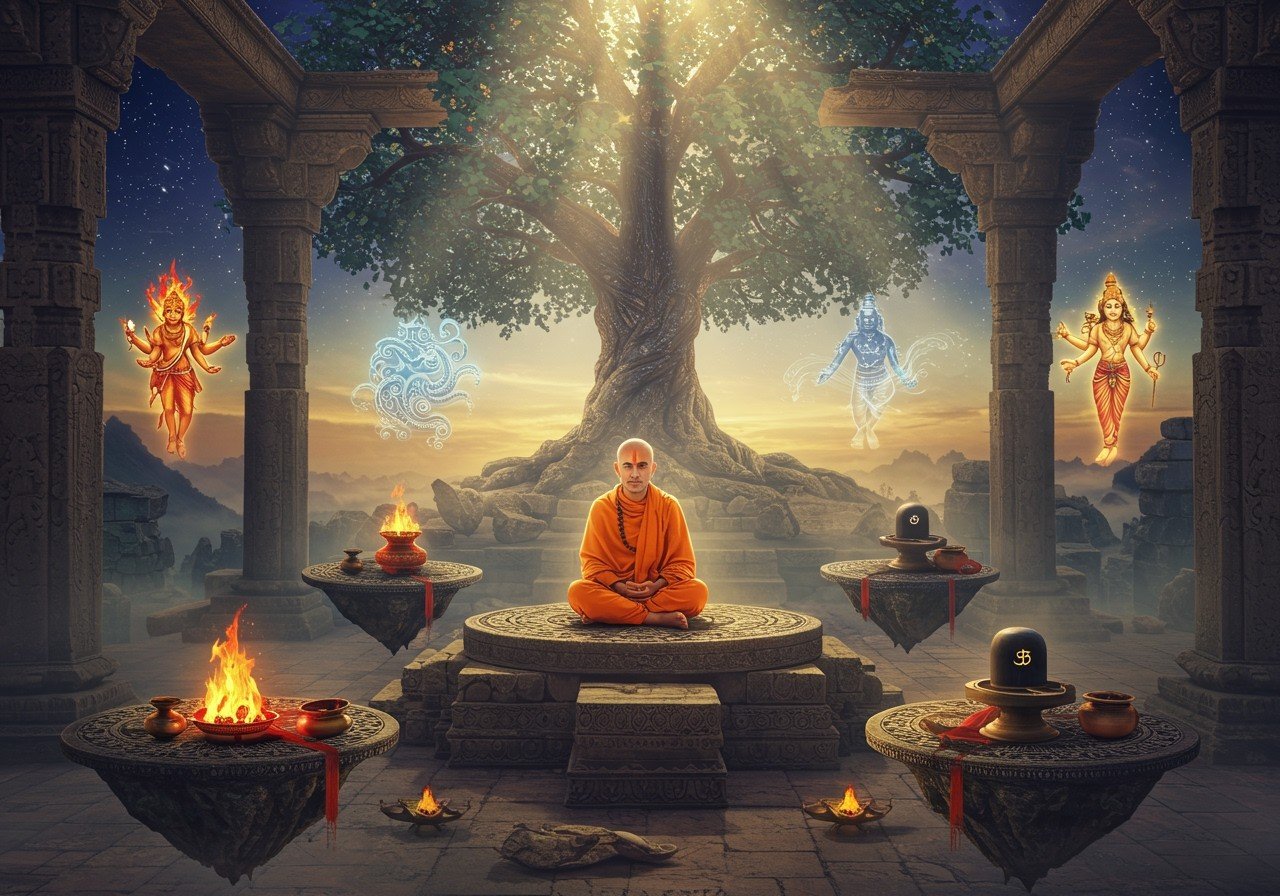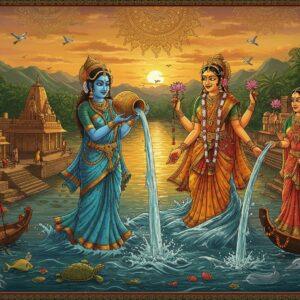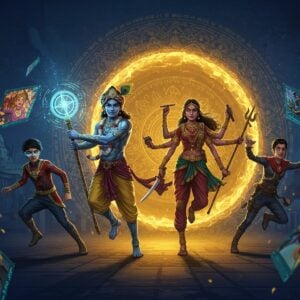
Vedic Hinduism, also known as Vaidika Dharma, is the foundation of Hindu beliefs and practices today. This ancient tradition draws from the Vedas, the oldest Sanskrit texts. These sacred scriptures offer guidance on rituals, sacrifices, and philosophical inquiries, all aimed at maintaining cosmic order and seeking blessings from the divine. For a deeper understanding of Hindu beliefs and practices, you can explore resources like Exploring Hinduism: Core Beliefs and Practices.
Understanding Vedic Cosmology
In Vedic cosmology, gods like Indra, Varuna, and Vishnu play significant roles in creating the universe. Indra is revered for his power over rain and war, wielding the thunderbolt Vajra. Varuna governs cosmic law, ensuring the universe adheres to its divine order, while Vishnu, often associated with protection and sustenance, ensures harmony in the universe. These deities reflect the interconnectedness of natural elements and spiritual principles. Delve deeper into the world of Hindu deities with our comprehensive guide: Hindu Gods and Goddesses: A Complete Guide.
Revered Deities and Elements
The Vedic religion celebrates various deities and personified elements. Agni, the deified fire, is central to many rituals, acting as a messenger between humans and gods, carrying offerings to the heavens. Soma, a sacred plant or drink, is used in sacrifices to invoke divine favor, believed to bestow immortality and spiritual insight. Such elements highlight the Vedic focus on nature’s sacredness and its role in spiritual practices. Discover the significance of Hindu temples and their connection to the divine at Hindu Temples Explained: A Guide to Their Significance.
Rituals and Sacrifices: The Heart of Vedic Practice
Rituals and sacrifices, known as yajnas, are crucial in Vedic Hinduism. These elaborate ceremonies, often involving fire altars and chanting of mantras, invite gods to partake in shared meals with the sacrificer and priests. Yajnas aim to sustain cosmic balance and secure blessings from the deities. They emphasize community participation and devotion as pathways to spiritual fulfillment. For a deeper understanding of Hindu rituals and their significance, we invite you to read Hindu Rituals: Significance and Importance.
The Path to Dharma
Vedic teachings outline four aims of life: Dharma (ethics/duties), Artha (prosperity/work), Kama (desires/passions), and Moksha (liberation/freedom from passions and ultimately saṃsāra). These principles guide individuals in achieving a balanced life, emphasizing duty, responsible wealth creation, fulfilling desires in a righteous manner, and ultimately, spiritual freedom. Dharma is central to maintaining societal order and personal growth. Gain further insights into the concepts of Dharma and Karma with our dedicated blog post: Dharma and Karma in Hinduism Explained.
Karma and Samsara: Life’s Eternal Cycle
The concepts of karma and samsara are pivotal in Vedic Hinduism. Karma denotes actions, intentions, and their consequences, shaping one’s future experiences – both in this life and future lives. Samsara represents the cycle of birth, death, and rebirth, driven by the accumulation of karma. Understanding these principles helps individuals seek liberation from this cycle through righteous living and spiritual practice. You can find products related to spiritual practices and achieving inner peace on Poojn.in: Tulsi Mala with Radha Locket.
Spiritual Duties and Liberation
Spiritual duties in Vedic Hinduism are guided by the Vedas’ teachings. These duties involve rituals, ethical conduct, and the pursuit of knowledge. The Brihadaranyaka Upanishad, one of the key scriptures, offers insights into escaping death and achieving liberation by understanding the cosmic connection underlying rituals. This knowledge, gained through study and contemplation, leads to freedom from worldly attachments and the cycle of samsara. Embark on a journey to understand the sacred texts of Hinduism with Sacred Texts of Hinduism: A Guide to Key Scriptures.
Embracing Non-Exclusivity
Vedic Hinduism embraces a non-exclusive approach to spirituality. It acknowledges that “God or Truth is one, and wise people refer to it by many names.” This inclusive view respects diverse religious paths, recognizing multiple ways to seek enlightenment and spiritual understanding, promoting tolerance and harmony amongst different beliefs. Learn more about the Vedas and their practical applications in modern life: Vedas: Ancient Wisdom for Modern Life – Practical Applications.
Sacred Spaces and Universal Connection
The Vedic religion posits a deep relationship between sacred places, such as sacrificial sites or pilgrimage destinations like the Draksharama Temple, and the universe. These spaces are seen as microcosms of the cosmos, imbued with divine energy, reflecting the interconnectedness of the material and spiritual worlds. These sites serve as focal points for spiritual practice and connection with the divine. Discover the spiritual significance of the Draksharama Temple with our blog: Draksharama Temple: A Spiritual Journey. You can enhance your spiritual journey with sacred items from Poojn.in, such as a Marble Dust Shiva Lingam for worship and meditation.
Poojn.in: Your Guide to Vedic Practices
Poojn.in simplifies the observance of Vedic Hindu practices by offering a wide selection of authentic ritual items and resources. You can find everything you need for Vedic rituals, from puja samagri kits and pure copper havan kund to dhoop, agarbatti, and sacred threads. Poojn.in also offers expert guidance on proper ritual procedures, ensuring you have the tools and knowledge for a meaningful spiritual experience. Explore our collection of Kushal Mangal Sandalwood Agarbatti for creating a sacred atmosphere during your rituals.
Conclusion: Embracing Vedic Wisdom
Vedic Hinduism’s teachings remain relevant in today’s world, offering profound insights into life’s purpose and cosmic harmony. Its principles of Dharma, Karma, and Samsara provide a framework for ethical living and spiritual growth. As we connect with the sacred and seek inner peace, we carry forward the Vedic legacy, enriching our lives with its timeless wisdom. Poojn.in helps you integrate these ancient teachings into your modern life, providing the resources and knowledge to connect with the divine and deepen your spiritual journey. Explore our collection of Bel Malas to enhance your spiritual practice.


